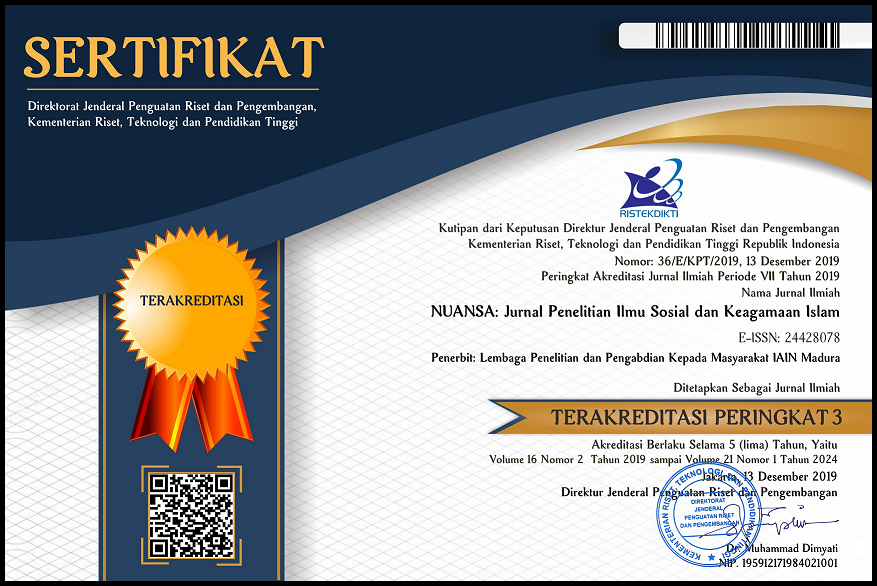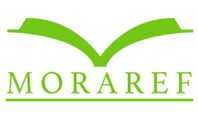PENERAPAN AL-QARDL PADA BANK KELILING (STUDI KASUS DI GRUGEK DESA SEJATI KECAMATAN CAMPLONG KABUPATEN SAMPANG)
 Abstract views: 512
,
Abstract views: 512
,
 PDF downloads: 1444
PDF downloads: 1444
Abstract
owe (al-qardl) is one of the transactions that is allowable in Islam. To lend, from the perspective of fiqh muamalah it is known as al-Qardl, is the process of hand over of wealth or al-mitsliyat to other people that the payment must be collected. In other word, it is a transaction that aimed to give al-mitsliyat over other people to be recollected with the similar al-mitsliyat. This kind of transection had been done in the era of prophet. As it becomes a phenomenon at Grugek, one of the sub-villages of Sejati village, Camplong district in Sampang regency. In Grugek, people owe money from a mobile-bank mostly for a consumptive objective and only a few of them use the money for something productive. Based on this phenomenon, the research is focused on the following problems: (a) how is the implementation of al-qardl transection promoted by mobile bank in Grugek sub-village, Sejati Village, Camplong district, Sampang Regency? (b) Why do people of Grugek sub-village, Sejati Village, Camplong district, Sampang regency tends to owe money from the mobile-bank than from official bank? This is a qualitative field research in form of case study that employs the result of interview and observation as primary data. The instruments that have been used to collect and check the data validity are intent observation, description, triangulation, and case analysis. The research result designates that: (1) the implementation of al-qardl is completed in easy ways; showing ID, no prerequisite and regulation as must be fulfilled in fiqh muamalah about the execution of interest in its implementation; (2) the people of Grugek owe money from mobile bank with several reasons: firstly, the process of credit is simpler than official bank does, easiness, no survey, only ID identification, people are allow to owe many times; secondly, people still do not know syariah finance institution that offers the product of al-qardl al-hasan.
Downloads
References
Abdur Rahman al-Jaziri, al-Fiqh ala al Madzahib al-Arba’ah, (Birut: Dar al Fikr, 1998)
Adiwarman Karim, Ekonomi Islam Suatu Kajian Kontemporer (Jakarta: Gema Insani Press, 2001)
Ahmad Mujahidin, Prosedur Penyelesaian Sengketa Ekonomi Syariah di Indonesia. (Bogor: Ghalia Indonesia, 2010)
Al-Shan’ani, Subul al-Salam Jilid 3 terj. Abu Bakar Muhammad (Surabaya: al-Ikhlas, 1995)
Al-Shan’ani, Subul al-Salam Jilid III ,terj.Abu Bakar Muhammad (Surabaya: Al-Ikhlas,1995)
Arifin. Imron, Penelitian Kualitatif Dalam Ilmu-ilmu Sosial dan Keagamaan (Malang: Kalimasahada Press, 1996)
Athwa. Ali /SHW) – Majalah Suara Hidayatullah edisi 10/XV/Dzulqa’dah-Dzulhijjah 1423
Ficary. Daud Abdullah, Buku Pintar Keuangan Syariah (Jakarta: Zaman, 2012)
Ghufron A.Mas’adi, Fiqh Muamalah Kontekstual (Jakarta: PT Raja Grafindo Persada, 2002)
A. Ghufron Mas’adi, Fiqh Muamalah Kontekstual (Jakarta: PT Raja Grafindo Persada, 2002)
Hasanah. Faridatul, Penerapan Qardul Hasan di Koperasi Syariah Nuri (KSN) Plak-plak Kecamatan Pagantenan Kabupaten Pamekasan, Pamekasan: STAIN Pamekasan, 2014
Hermawan Warsito, Pengantar Metodologi Penelitian (Jakarta: Gramedia Pustaka Utama,1993)
Imron Arifin, Penelitian Kualitatif Dalam Ilmu-ilmu Sosial dan Keagamaan (Malang: Kalimasahada Press,1996)
K. Mervin Lewis dan M. Latifah Algaoud, Perbankan Syariah Prinsip, Praktik dan Prospek (Jakarta: Serambi, 2001)
Lexy J. Moleong, Metode Penelitian Kualitatif (Bandung: PT. Remaja Rodakarya,tt.
Muhammad, Manajemen Dana Bank Syariah. Yogyakarta: Ekonisia, 2004)
Naja. Daeng, Akad Bank Syariah (Yogyakarta: Pustaka Yustisia, 2011)
Nawawi. Ismail, Isu-isu Ekonomi Islam; Kompilasi Pemikiran dan Teori Menuju Praktik di Tengah Arus Ekonomi Global Buku 1 Nalar Filsasat (Jakarta: VIV Press, 2013)
Neong Muhajir, Metode Penelitian Kualitatif (Yogyakarta: Kode Serasih, 1996)
Nur hayati. Sri, Akuntansi Syariah di Indonesia (Jakarta: Salemba Empat, 2011)
Rahmat. Syafei, Fiqh Muamalah (Bandung: CV. Pustaka Setia, 2000)
Soerjono Soekamto, Pengantar Penelitian Hukum (Jakarta: Universitas Indonesia Press, 1982)
Soetandyo Wigjosoebroto, Hukum: Paradigma Metode dan Dinamika Masalahnya. (Jakarta: Elsam dan Huma, 2002)
Sudarwan Danim, Menjadi Peneliti Kualitatif (Bandung: Pustaka Setia, 2002)
Swastha. Basu dan Sukotjo. Ibnu, Pengantar Bisnis Modern; Pengantar Ekonomi Perusahaan Modern (Yogyakarta: Liberty, 1988)
Syarifuddin. Amir, Garis-garis Besar Fiqh (Jakrta: Kencana, 2013)
Tim Penyusun, Kamus Besar Bahasa Indonesia Edisi ke Tiga. Jakarta: Balai Pustaka, 2005
Wahbah Zuhaily, al-Fiqh al-Islam wa Adillatuh (Birut: Dar al Fikr, 1998)
Warsito. Herman, Pengantar Metodologi Penelitian. Jakarta: Gramedia Utama, 1993.
The journal operates an Open Access policy under a Creative Commons Attribution-NonCommercial 4.0 International License (CC-BY-NC) 
Authors who publish with this journal agree to the following terms:
- Authors retain copyright and grant the journal right of first publication with the work simultaneously licensed under a Creative Commons Attribution License that allows others to share the work with an acknowledgement of the work's authorship and initial publication in this journal.
- Authors are able to enter into separate, additional contractual arrangements for the non-exclusive distribution of the journal's published version of the work (e.g., post it to an institutional repository or publish it in a book), with an acknowledgement of its initial publication in this journal.
- Authors are permitted and encouraged to post their work online (e.g., in institutional repositories or on their website) prior to and during the submission process, as it can lead to productive exchanges, as well as earlier and greater citation of published work.






















